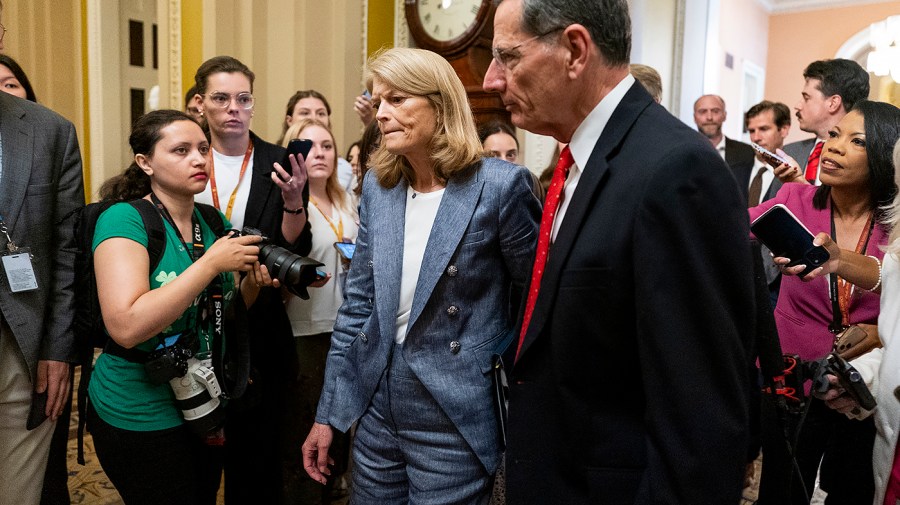
Senate Republicans endured a grueling 26-hour legislative session before finally passing President Trump’s ambitious tax and spending package early Tuesday afternoon. The bill, which represents a significant step toward cementing Trump’s economic agenda, now heads to the House of Representatives. The pressing question remains whether the House can meet the GOP’s self-imposed July 4 deadline for passing the legislation. This bill aims to make permanent many of the Trump tax cuts from 2017, eliminate certain taxes on tips and overtime, and enact the largest-ever cuts to Medicaid.
With the Senate’s work temporarily concluded, the focus shifts to the House. Here are five key takeaways from the Senate’s legislative process and what lies ahead.
Thune’s Legislative Victory
Senate Majority Leader John Thune (R-S.D.) achieved his first major legislative victory since assuming leadership of the GOP conference. This success bolsters his standing with both his Senate colleagues and President Trump, as more legislative battles loom on the horizon. The final vote was the culmination of months of negotiations, particularly with Senator Lisa Murkowski (R-Alaska), whose support was pivotal.
Thune’s approach, which included decentralizing power within the conference and empowering committee chairs, was instrumental in navigating the complex legislative landscape. His ability to maintain patience and guide members toward consensus was highlighted by Senator Mike Rounds (R-S.D.), who remarked,
“He’s got patience that very few people are gifted with. You can’t make anybody do anything. But what you can do is help them to get to a decision, and that’s what he’s doing.”
Thune’s leadership was further demonstrated through his effective communication with Murkowski, culminating in key discussions that secured her vote. His efforts to unify conservatives through individual discussions and conference meetings were also noted by Senator Katie Britt (R-Ala.), who stated,
“This will be huge, and people know that he can get it done.”
Murkowski’s Strategic Concessions
Senator Lisa Murkowski once again proved adept at leveraging her vote for significant concessions benefiting her home state of Alaska. Her negotiations resulted in a $50 billion allocation for a rural hospital fund, doubling the initially proposed amount. Additional Alaska-specific provisions included a tax exemption for fishers from western Alaska villages and an increased deduction for whaling captains’ expenses.
While some colleagues criticized the cost of securing Murkowski’s support, she defended her actions as fulfilling her obligations to her constituents. Senate Budget Committee Chair Lindsey Graham (R-S.C.) praised her as
“tough” but “reasonable,”
emphasizing her commitment to Alaska’s unique needs.
Not all were pleased with the Alaska-specific inclusions. Senator Rand Paul (R-Ky.) expressed concern about the financial implications, stating,
“The bill got more expensive to get her vote. There had to be a purchasing of her vote, so there was billions and billions of dollars given to her.”
Political Risks of Crossing Trump
The legislative battle underscored the political risks of opposing President Trump. Senator Thom Tillis (R-N.C.) announced he would not seek reelection after opposing Medicaid cuts in the package and facing backlash from Trump. This serves as a cautionary tale for other Republicans, highlighting the potential repercussions of defying the president’s agenda.
Trump’s influence remains a significant factor in Republican politics, as evidenced by his swift response to Tillis’s opposition. The president’s ability to sway party members and the looming threat of primary challenges underscore the delicate balance Republican lawmakers must navigate.
Challenges Await in the House
The Senate’s passage of the bill sets the stage for a challenging battle in the House of Representatives. Speaker Mike Johnson (R-La.) faces significant hurdles as at least six House GOP members have expressed their intention to vote against the Senate’s version. This complicates efforts to meet the Independence Day deadline, as any changes in the House would necessitate another Senate vote.
House Republicans are voicing dissatisfaction with the Senate’s modifications, with one moderate member expressing frustration over the bill’s perceived deterioration. The dynamics require Johnson, with Trump’s assistance, to rally support within his party to secure passage.
Will House Conservatives Follow Suit?
The question remains whether House conservatives will align with their Senate counterparts. Previous resistance from hard-liners, including members of the House Freedom Caucus, has often been mitigated by presidential intervention. Representative Ralph Norman (R-S.C.) and Representative Chip Roy (R-Texas) have already voiced opposition, yet acknowledge the pressure to comply with the president’s agenda.
As the deadline approaches, the House faces a critical decision. The outcome will not only impact the legislative success of Trump’s tax bill but also set the tone for future intra-party negotiations and the GOP’s legislative strategy.
As the legislative process unfolds, the implications of the Senate’s actions and the House’s response will reverberate throughout the political landscape, shaping the trajectory of Trump’s economic policies and the Republican Party’s legislative priorities.






